Bildung, Kompetenzen und Arbeitsmarkt
Die Forschungsgruppe erforscht die Entstehung und die Auswirkungen von Kompetenzen. Als wesentliche Bestimmungsfaktoren für die Entwicklung von Kompetenzen untersucht die Gruppe insbesondere den familiären Hintergrund, schulische Bildung und Weiterbildung am Arbeitsplatz. Effekte höherer Kompetenzen auf den Arbeitsmarkterfolg werden über die gesamte berufliche Laufbahn hinweg analysiert. Außerdem beschäftigt sich die Gruppe mit Veränderungen in der Nachfrage nach Kompetenzen infolge von technologischem und strukturellem Wandel.
Forschungscluster
Produktivität und InstitutionenIhr Kontakt

- Abteilung Strukturwandel und Produktivität
Referierte Publikationen
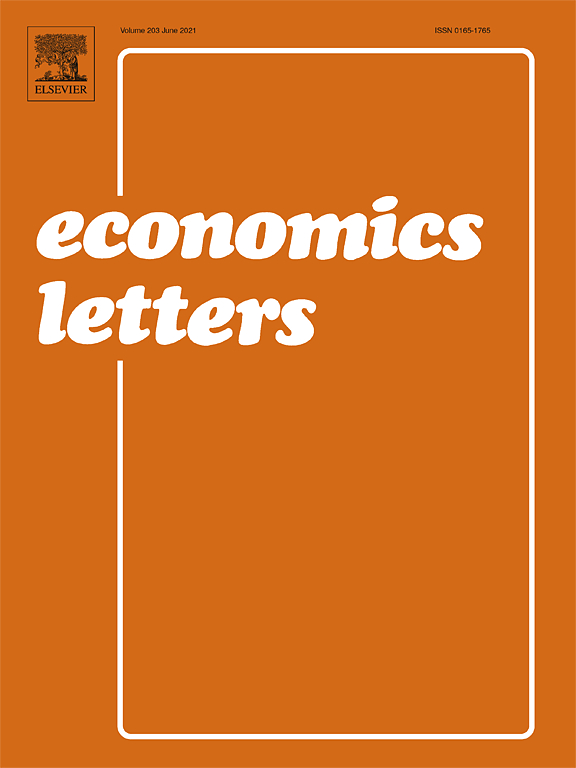
Coping with Change: International Differences in the Returns to Skills
in: Economics Letters, April 2017
Abstract
<p>International data from the PIAAC survey allow estimation of comparable labor-market returns to skills for 32 countries. Returns to skills are larger in faster growing economies, consistent with the hypothesis that skills are particularly important for adaptation to economic change.</p>
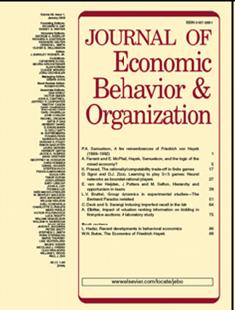
Team Building and Hidden Costs of Control
in: Journal of Economic Behavior and Organization, March 2016
Abstract
<p>In a laboratory experiment, we investigate the interaction of two prominent firm strategies to increase worker effort: team building and control. We compare a team-building treatment where subjects initially play a coordination game to gain common experience (CE) with an autarky treatment where subjects individually perform a task (NCE). In both treatments, subjects then play two-player control games where agents provide costly effort and principals can control to secure a minimum effort. CE agents always outperform NCE agents. Conditional on control, however, CE agents’ effort is crowded out more strongly, with the effect being most pronounced for agents who successfully coordinated in the team-building exercise. Differential reactions to control perceived as excessive is one explanation for our findings.</p>

Returns to Skills around the World: Evidence from PIAAC
in: European Economic Review, January 2015
Abstract
<p>Existing estimates of the labor-market returns to human capital give a distorted picture of the role of skills across different economies. International comparisons of earnings analyses rely almost exclusively on school attainment measures of human capital, and evidence incorporating direct measures of cognitive skills is mostly restricted to early-career workers in the United States. Analysis of the new PIAAC survey of adult skills over the full lifecycle in 23 countries shows that the focus on early-career earnings leads to underestimating the lifetime returns to skills by about one quarter. On average, a one-standard-deviation increase in numeracy skills is associated with an 18 percent wage increase among prime-age workers. But this masks considerable heterogeneity across countries. Eight countries, including all Nordic countries, have returns between 12 and 15 percent, while six are above 21 percent with the largest return being 28 percent in the United States. Estimates are remarkably robust to different earnings and skill measures, additional controls, and various subgroups. Instrumental-variable models that use skill variation stemming from school attainment, parental education, or compulsory-schooling laws provide even higher estimates. Intriguingly, returns to skills are systematically lower in countries with higher union density, stricter employment protection, and larger public-sector shares.</p>

How Can Skill Mismatch be Measured? New Approaches with PIAAC
in: Methods, Data, Analyses, Nr. 2, 2014
Abstract
<p>Measuring skill mismatch is problematic, because objective data on an individual skill level are often not available. Recently published data from the Program for the International Assessment of Adult Competencies (PIAAC) provide a unique opportunity for gauging the importance of skill mismatch in modern labor markets. This paper systematically compares existing measures of skill mismatch in terms of their implications for labor market outcomes. We also provide a new measure that addresses an important limitation of existing measures, namely, assigning a single competency score to individuals. We find that the importance of skill mismatch for individual earnings differs greatly, depending on the measure of mismatch used.</p>

Heterogeneous Treatment Effects in Groups
in: Economics Letters, Nr. 3, 2013
Abstract
<p>We show in a laboratory experiment that the same method of group induction carries different behavioral consequences. These heterogeneous treatment effects can be directly related to the quality of the relationship established between the subjects. Our results indicate the importance of manipulation checks in group-formation tasks in economic experiments.</p>
Arbeitspapiere
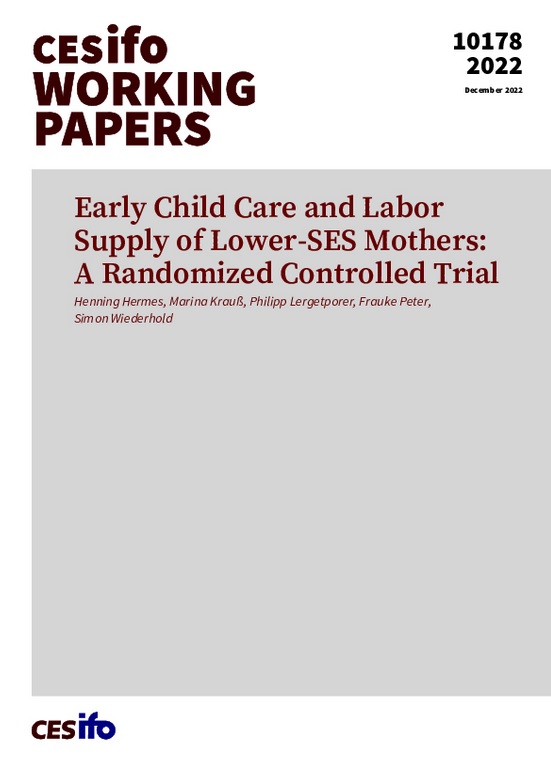
Early Child Care and Labor Supply of Lower-SES Mothers: A Randomized Controlled Trial
in: CESifo Working Paper, Nr. 10178, 2022
Abstract
<p>We present experimental evidence that enabling access to universal early child care for families with lower socioeconomic status (SES) increases maternal labor supply. Our intervention provides families with customized help for child care applications, resulting in a large increase in enrollment among lower-SES families. The treatment increases lower-SES mothers' full-time employment rates by 9 percentage points (+160%), household income by 10%, and mothers' earnings by 22%. The effect on full-time employment is largely driven by increased care hours provided by child care centers and fathers. Overall, the treatment substantially improves intra-household gender equality in terms of child care duties and earnings.</p>
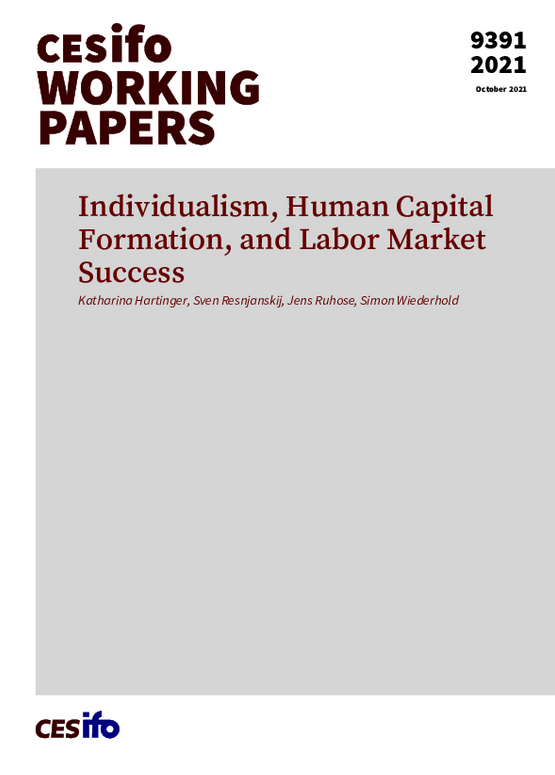
Individualism, Human Capital Formation, and Labor Market Success
in: CESifo Working Paper, Nr. 9391, 2021
Abstract
<p>There is an ongoing debate about the economic effects of individualism. We establish that individualism leads to better educational and labor market outcomes. Using data from the largest international adult skill assessment, we identify the effects of individualism by exploiting variation between migrants at the origin country, origin language, and person level. Migrants from more individualistic cultures have higher cognitive skills and larger skill gains over time. They also invest more in their skills over the life-cycle, as they acquire more years of schooling and are more likely to participate in adult education activities. In fact, individualism is more important in explaining adult skill formation than any other cultural trait that has been emphasized in previous literature. In the labor market, more individualistic migrants earn higher wages and are less often unemployed. We show that our results cannot be explained by selective migration or omitted origin-country variables.</p>
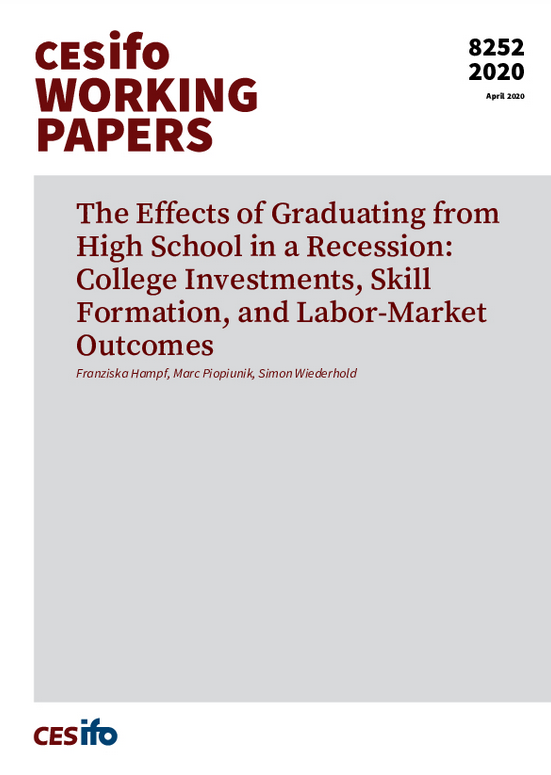
The Effects of Graduating from High School in a Recession: College Investments, Skill Formation, and Labor-Market Outcomes
in: CESifo Working Paper, Nr. 8252, 2020
Abstract
<p>We investigate the short- and long-term effects of economic conditions at high-school graduation as a source of exogenous variation in the labor-market opportunities of potential college entrants. Exploiting business cycle fluctuations across birth cohorts for 28 developed countries, we find that bad economic conditions at high-school graduation increase college enrollment and graduation. They also affect outcomes in later life, increasing cognitive skills and improving labor-market success. Outcomes are affected only by the economic conditions at high-school graduation, but not by those during earlier or later years. Recessions at high-school graduation narrow the gender gaps in numeracy skills and labor-market success.</p>













